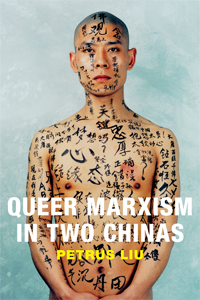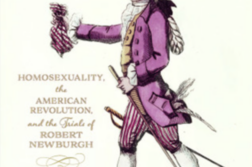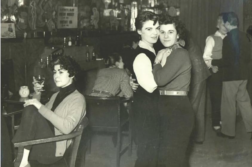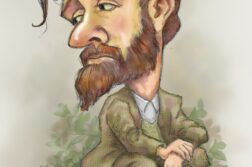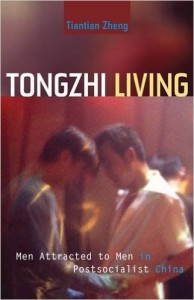 Tongzhi Living: Men Attracted to Men
Tongzhi Living: Men Attracted to Men
in Postsocialist China
by Tiantian Zheng
U. of Minnesota. 244 pages, $27.
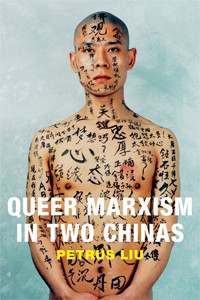 Queer Marxism in Two Chinas
Queer Marxism in Two Chinas
by Petrus Liu
Duke U. Press. 244 pages, $23.95
“VOMIT” SEEMS TO BE the first word that came to mind when sociologist Tiantian Zheng asked sixty randomly selected people in the provincial Chinese city of Dalian what they thought of homosexuals. “They make me want to vomit,” says one man in his forties. Another man, when asked about accepting homosexuals, ups the ante: “Are you kidding me? They make me vomit the food I ate ten years ago!”
“A normal man should kick a homosexual couple in a park into the lake, and a homosexual couple on a bus off the bus,” says another. “Those who have the money can solve the problem with transgendered surgeries, and those who do not have money can find a place to castrate themselves with a knife. Those who have neither money nor courage should find a tree where they can hang themselves so that they can be reincarnated as a real man.”
For a culture whose traditional art has given Westerners the impression of extreme refinement and delicacy, the modern Chinese penchant for uncompromising moral judgments can be startling to Americans, who seem to be falling over themselves these days to find new euphemisms that avoid offending anyone. Other words used frequently in Dalian among the taxi drivers, businesspeople, hotel workers, college professors, and government officials include “sick,” “disgusting,” “sickening,” “abnormal,” “freak” and “not moral.”
Tiantian Zheng is a straight Chinese woman who teaches anthropology at SUNY-Cortland and went back to China over the course of three years to gather data about gay men in a provincial city on the coast northeast of Beijing that—like so many provincial cities in China that the average American has never heard of—has a population of a mere twenty million. While there, she hung out in a park where “tongzhi” go to cruise and relieve the pressures of being gay in China. She also went to gay bars and even a bathhouse (where she blended in as a “fake woman,” i.e., a transvestite). Though written in the flat-footed jargon of sociological analysis, the stories she gathered are as shocking as they are sad, especially in a chapter about the pressure to get married and the relationship tongzhi have with their families.
Petrus Liu’s book is quite different. Liu, a professor of literature in Singapore at Yale-NSU, the first foreign campus Yale University has established abroad, takes queer theory and Marxism and applies them to an analysis of contemporary Chinese films and novels, with an eye on the cultural rivalry between the Republic of China (Taiwan) and the People’s Republic of China (the mainland).
To read about gay life in Dalian as a gay American is partly to see oneself in a mirror, so much of it is familiar: family pressures, tops and bottoms, social class and ageism. The word tongzhi means “comrade”—a usage, Liu points out, that mocks the Communist past in the way that the American “queer” mocks homophobes of an earlier era. Other terms we learn from Zheng: 419 is a one-night stand; 1 is a top, 0 is a bottom. And you are a zero if you’re a bottom in China. The old division between being a penetrator and being the penetrated is a universal one, apparently, even if modern American and European gay men have tried to subvert it. Either way, whether a 1 or a 0, you are not exactly admired by your countrymen. Even tongzhi who want to know if someone is gay ask: “Is there something wrong with him?” (Of course, Andy Warhol used “Does he have a problem?” which is, I suppose, not much more gay-affirming.)
As in every other country, tongzhi are separated by social and economic class lines. The gold-collar are the rich, the red-collar are the people who’ve been able to pass the difficult national test that gets them good government jobs. Gray-collar are college students who can only get part-time or manual work. Neither the gold- nor the red-collar wants to be outed, much less blackmailed, so they avoid bars and bathhouses and either maintain a relationship or have sex with “money boys” arranged by madams in on-line brothels. A gold-collar gay may rent two hotel rooms for the assignation—one for the sex, and one to move to afterwards so the money boy cannot come back and find him. Money boys are generally rural migrants whose “alleged dirtiness and dark skin color but also … their clothes, speech, and behavior” earn them the scorn of people in the cruise park. “Rural migrants always wear ugly clothes,” one of Zheng’s subjects tells her. “They are abhorrent. Once I was on a bus, a rural migrant got on the bus and sat next to me. I immediately stood up and left. There’s no way I’d allow such a rural migrant wearing dirty clothes and worn-out shoes to sit next to me!” This must be why Zheng calls the People’s Republic postsocialist, though there’s something timeless in this anecdote as well.
Class distinctions among the tongzhi are nothing, however, compared to the contempt for gay people held by the majority of Chinese. The degree to which tongzhi must remain in the closet—while being harassed by police and pressured by parents to get married—will probably horrify the American reader, when it’s not laughable. “Honestly,” one on-line blog reads, “should our country pass same-sex marriage laws and allow same-sex marriages, most tongzhi would not come out of the closet.” Though China decriminalized sodomy in 1997 and removed homosexuality from the list of mental illnesses in 2001, it seems to have made no difference in the way gays are regarded by society at large and, sadly, by gays themselves. It’s hard to imagine how a highly traditional culture based on Confucian ideas of the family is ever going to accept gay people.
This “postsocialist” society’s ideal of being a “normal” person who does not stand out, who fits in (with a billion and a third people), seems intensely bourgeois. What matters are family, status, wealth, and children. So tongzhi must reproduce. “In China,” Zheng writes, “it is estimated that sixteen million wives of tongzhi are currently living in ‘loveless’ and ‘sexless’ marriages.” Tongzhi marry women to satisfy their parents, friends, and fellow workers but go on having sex with other men until their wives find their smart phones and jump off the roof. When that happens, at least in the case Zheng describes of a 31-year-old professor at Sichuan University, the suicide not only receives immense media coverage but all the sympathy goes to the deceased. The villain is the gay man who deceived her. “If possible, I indeed hope that one day same-sex marriage can be implemented in China,” is what the dead woman wrote on Twitter before killing herself. “That way, even though we are unable to change some people’s selfish nature, maybe it can avoid many tragedies?” Women who marry gay men are called “living widows.” There is even, we learn in Queer Marxism in Two Chinas, a TV show called What are we doing to rescue the wives of homosexuals?
Oh, that Chinese bluntness, realism, lack of sentimentality, and disdain for individuality! Questions asked when cruising in Dalian are: Are you a 1 or a 0? How big is your penis—dead (soft), and alive (erect)? Are you good-looking? Forget it if you’re fat or effeminate or wear the wrong shoes. The overweight young man in the AIDS project Zheng visits says he never gets laid. Even tongzhi think the way gay men treat one another is rotten and consider heterosexual relationships far more humane. The roles of 1’s and 0’s merely imitate the traditional genders. 0’s expect their 1’s to pay for whatever they might desire. One of Zheng’s interviewees has to sell his blood in order to keep his 0 in the bling to which the latter aspires. Materialism is rampant. The executive of the AIDS organization is not only having sex at the office but embezzling money acquired by insisting that his staff write fake invoices. As for AIDS prevention, the view of condoms is precisely the opposite of what it should be. Condoms in Dalian are associated by gay men with promiscuity—so if your trick has a condom, you should not sleep with him, whereas if you really like your partner, it would be unromantic to insist on protection.
The pressure from families is constant. “How shameful it is to have this kind of malady,” says the mother of one of Zheng’s subjects. “What’re you going to do with your life having this malady?” Her son Xiao Lin replies: “Let’s stop talking about this, ma.” Mother: “Wouldn’t it be great to get married? … Then we’ll no longer need to worry about you. … Why don’t you marry?” Xiao Lin: “It’s OK as long as I am happy, right?” Mother: “If you don’t correct it, you’ll harm your family as well as other people.” And then the inevitable—Xiao Lin: “Ma, I assure you that I’ll definitely get married.”
Even when gay people are acknowledged to exist, they continue to be seen as primarily a medical problem (AIDS) or a source of agony for the straight women they marry to please their families. Cui Zi’en, the only out filmmaker in China, is a professor at a film institute in Beijing but not allowed to teach courses because of his homosexuality. The administrators of AIDS programs must be straight. The human rights advisor to the Republic of China (Taiwan) says that “Heaven sent AIDS as a punishment so that we can distinguish men from animals,” and recommends that the infected be quarantined in “AIDS villages.” On page 163 of Liu’s book we find a photo that says as much as the entire text. A cop has arrested men at a private party. The men are all kneeling on the floor in rows, covering their faces with their hands in what amounts to a posture of abject shame. “When they refuse to be cured,” someone in the media says, “they are no different from those who run around soccer playground naked, attached to a tag that reads ‘proclivity to expose sexual organs.’”
And yet, ancient Chinese literature, as both Zheng and Liu point out, provides evidence of lively traditions of homosexuality. Homophobia is blamed, as usual, on the British colonial powers for introducing prejudice into a culture that had none. Even Americans may know the story of the Cut Sleeve, in which an emperor severed the sleeve on which his favorite boy had fallen asleep rather than awaken him. Then there is this footnote in Zheng’s book:
It was recounted that in the Northern Dynasties (A.D. 386-535), a famous scholar Chen Chien, because of his large penis, caused intercourse to be very painful for his sexual partner—the sixteen-year-old boy Zi Gao (Ruan 1991). To endure the pain, Zi Gao bit on the bed covers so hard that he destroyed the covers. When asked if he was hurt, Zi Gao responded, “My body is yours. I am loved by your love; even death is worthy.”
Both Zheng and Liu reproach Western scholars for thinking they invented homosexuality. Both dispute Foucault’s claim that the idea of the homosexual was born in Europe in 1870. Both take issue with Dennis Altman’s idea that gay liberation in Asia is a product of gay liberation in the West. (And both books are exactly 244 pages long, which leads one to wonder: is this coincidence or Chinese superstition about numbers?) But otherwise they are very different. Zheng’s portrays a cruise park in Dalian. Liu discusses the gay Chinese intelligentsia through an analysis of recent Chinese films and novels. Liu decries the “homonormative”—the acceptance of the general structure of things in exchange for assimilation, e.g., gay marriage, which, Liu argues, reduces homosexuals to mere consumers. Liu’s China—both Beijing and Taiwan—is a far cry from the depressed closet cases in Dalian. Who knew there was a boom in the gay novel in China in the ’90s, which Liu thinks began in the ’80s with books like Pai Hsien-yung’s Crystal Boys or Chen Ruoxi’s Paper Marriage? (The latter, Liu says, is the novel of which Ang Lee’s film The Wedding Banquet is a “loose cinematic variant.”) Liu portrays—and exemplifies—a vibrant dialog between mainland China and Taiwan, and other cities of the Chinese Diaspora like Hong Kong and San Francisco. In Paper Marriage, a Chinese woman weds a gay American in order to stay in the U.S. To Liu this plot illustrates the injustice of national borders, not to mention the larger issues of neoliberalism and global capitalism. In fact, he finds fault with marriage of any kind as a form of private property, and quotes the film maker Cui Zi’en: “Every time I travel to the United States and see these boundless, gigantic, extravagantly constructed private houses, I become afraid. No human being needs all that space … human beings cannot give up the progress we made over private property just because [of]a few problems we ran into with socialized land ownership. To me, communism is the courage to pursue a better future, to imagine a utopia, despite all the hardships and setbacks in the present.”
But just how Marxist analysis informs gay culture in mainland China and Taiwan Liu does not make clear. When not writing theory, Liu is quite eloquent. But his discussion of these novels and films that most Americans have never heard of, one suspects, would be just as interesting without the Marxism. The last six pages of his book, devoted to Marx’s labor theory of value, are stupefying, and what they have to do with what has come before remains a mystery. Still, it is interesting that in his view the government in Taiwan sees gay rights as merely something to be employed to portray the People’s Republic as backward. (Liu himself got the mayor of Taipei to publicly accept a rainbow flag signed by Gavin Newsom, then mayor of San Francisco.) Neither Taipei nor the U.S. government, he says, cares about homosexuals themselves. Indeed, the end of his book is replete with examples of Taiwan’s disdain for tongzhi who fall outside the limits of respectable behavior.
“In this uncanny convergence of queerness, Marxism, and two Chinas,” Liu writes, “we find an alternative imagination of human creativity, fulfillment, and freedom.” But I suspect that the world is now too big even for such analysis. Consider Ang Lee, a Chinese-American filmmaker not discussed in either book. Lee was born and raised in Taiwan by a father who taught him Chinese calligraphy and wanted him to study law. Ang Lee did not want to be a lawyer, so he went to film school at NYU and was out of work until a mentor in Taiwan encouraged him to make a film about Chinese Americans (Pushing Hands), which he followed with The Wedding Banquet (1993). He later made a film that stunned many gay Americans: Brokeback Mountain, based on a short story written by a straight American woman, starring an Australian actor, and scored by a composer from Argentina. That’s the sort of world we’re living in now—from Marxism to global capitalism, and the spread of the Enlightenment values of the West.
Both of these books are written in social science jargon, which means that what’s interesting to the lay reader is only what we can occasionally glimpse between floating glaciers, ice packs of ghastly prose. These are books written by professors, published by university presses, that comment on their peers’ previous works, so it’s pointless to complain that the language is technical. But among words this reader had to look up were: alterity, foundationalism, catachresis, theodicy, deictic, instantiate, heteroglossia, ontologized, chiasmic—in sentences like this: “Queer Marxism engages questions of location and situatedness without reifying alterity.” Privilege of course is used, as it always is in Queer Theory, as a verb, but Liu employs imaginary as a noun (“the cultural imaginary”). If one of the tropes about ancient and modern China is inscrutability, then Queer Theory, especially when Liu adds slabs of Marxist analysis, adds yet another. Forbidden City, Forbidden Text! Common Chinese vitriol is more fun—my new favorite, from a footnote in Liu, is “stinky leftist”—though what a privilege to find this merely amusing, without having to live with it, as the tongzhi in the cruise park in Dalian do.
Of course, the gap between a money boy in a cruise park in Dalian and a Yale professor going to independent film festivals in Taiwan with activists and intellectuals is vast. The queens in the park in Dalian are far away from a privileged academic in Singapore. But the two books complement one another. One learns not only what a gay bathhouse in Dalian is like but also what books and films have already appeared in China on homosexual life. China is huge and changing; China is ancient and modern, full of contradictions, and, like Russia, defensive about the West. After reading these books, as fascinating as they are, I still don’t have a clear sense of what gay life is like in that country for the average person. Given that China now has 1.4 billion people (one fifth of the world’s gays, Zheng points out), this leaves, if we use the figure of three percent (the estimate for same-sexers in the U. S.), 42 million stories we have not heard.
“I want to end this book on a positive note,” Zheng writes, but her research depicts what seems to be a miserable trap for gay men in China. On the other side of the ledger is the rapidity of change—and the fact that gay rights seem to have become a badge of modernity around the world. Years ago, my gay world was circumscribed by the Eagle’s Nest on 21st Street and the Everard Baths on 28th in New York City; today, acceptance of homosexuals has become one of the defining features of advanced industrial states. A man Zheng talks to in Dalian tells her he was chatting with a friend on-line when the friend disclosed his sexual identity. “Hearing that he was homosexual,” he tells Zheng, “I terminated the chat immediately. I was so terrified that every hair on my head stood up straight because of the fear. I got rid of him as a friend after that.” Perhaps we may hope for less of that in the future in China.
Andrew Holleran’s novels include Grief and The Beauty of Men.


